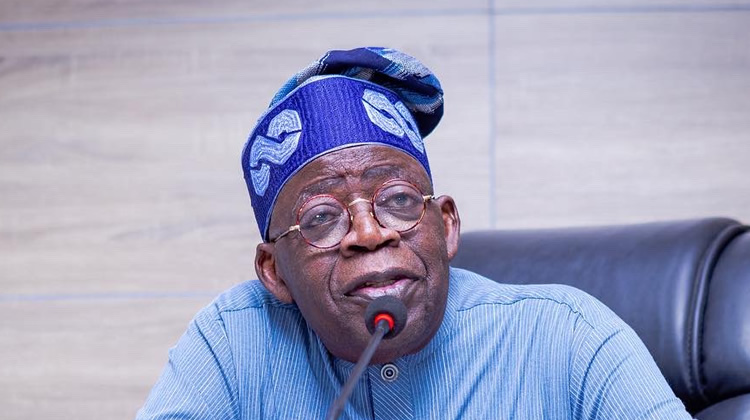
The Tinubu campaign council described the rumour as “misinformation campaign” being promoted in the North-West by “some elders on the payroll of the Peoples Democratic Party.”
This is contained in a press statement signed by the Director, Media & Publicity, APC PCC, Bayo Onanuga, on Tuesday.
The statement stressed that Tinubu had no plans to relocate the country’s seat of power from its current Abuja location, adding that he would not do anything deemed to be against the constitution of the nation.
The statement read, “The All Progressives Congress Presidential Campaign Council hereby alerts Nigerians about (to) the latest insidious campaign in some parts of the country against our candidate, Asiwaju Bola Ahmed Tinubu.
“After exhausting their arsenal of calumnies and character assassination against Tinubu, the opposition PDP and their surrogate Labour Party have begun a multi-pronged desperate campaign of falsehoods.
“In one of the falsehoods being circulated, especially in the North-West of the country, Tinubu is said to harbour plans to relocate the Federal Capital from Abuja to Lagos on succeeding President Muhammadu Buhari from 29th May, 2023.
“This misinformation campaign, according to field reports, is being given some traction by some elders on the payroll of the Peoples Democratic Party.
“We are shocked that some people could contrive such egregious lie, all in the name of politics, with the intention to confuse our burgeoning support-base in that part of the country.
“Let us say with emphasis that Asiwaju does not contemplate any such plan and will not do anything that is so ultra-unconstitutional.
“The same purveyors of falsehood have also been distorting the commercialisation of the Nigerian National Petroleum Company Limited by the APC government of President Muhammadu Buhari.
“The truth is that President Buhari has not privatised the NNPC as planned by the PDP presidential candidate, Atiku Abubakar. Buhari has instead made it a commercial entity, owned by all the tiers of government, in line with the Petroleum Industry Act.
“In due course, the company will be in a position to declare and share dividends to all its owners, the way Aramco of Saudi Arabia and Petrobas of Brazil do.
“As the destined successor of President Buhari, Asiwaju Tinubu will continue the policy of the Buhari administration. Unlike Atiku, Tinubu has no plan to sell the NNPC to his friends or cronies.”
Relocated from Lagos to Abuja
Up until December 11, 1991, Lagos State was Nigeria’s seat of power.
Nigeria’s fourth Head of State, General Murtala Muhammed, initiated the process to move the FCT from Lagos to Abuja by setting up a panel to that effect in August 1975.
The panel was headed by Justice Akinola Aguda and was mandated to advise if Lagos should retain its twin roles of being both state and federal capital; or if the capital was to move from Lagos. It also had as part of its responsibilities to recommend an alternative to the Lagos location should it find Lagos unsuitable for retaining the federal capital status.
The panel recommended that the nation’s capital should be moved from Lagos to Abuja.
Lagos’ population boom, which made it to be overcrowded and its conditions squalid, as well as the rapid economic development already being witnessed in Eko and the need to expand the economy towards the inner parts of the country, including the leaning of Lagos towards a particular ethnic group, all informed the panel’s decision to settle for Abuja, which was in the earlier 20th century the name of the nearby town now called Suleja.
In 1976, General Murtala Muhammed, heeding the recommendation of the panel and considering a logic similar to the way Brazil planned its capital, Brasília, announced in a nationwide broadcast that Abuja would be the new capital of Nigeria, adding that the city would undergo development to that effect.
The broadcast was the promulgation of Decree No. 6 on February 4, 1976, which initiated the removal of the Federal Capital from Lagos to Abuja.
In the broadcast, General Muhammed said, “The area (Abuja) is not within the control of any of the major ethnic groups in the country. We believe that the new capital created on such virgin lands, as suggested, will be for all Nigerians a symbol of their oneness and unity. The Federal Territory will belong to all Nigerians.”
General Murtala Mohammed was, however, assassinated on February 13, 1976, nine days after his broadcast on the relocation of the FCT from Lagos to Abuja. Hence, he could not see the process through.
On December 12, 1991, General Ibrahim Babangida, the military Head of State at the time, officially moved Nigeria’s seat of power from Lagos to Abuja, putting an end to a title that had been held by Lagos since 1914.





